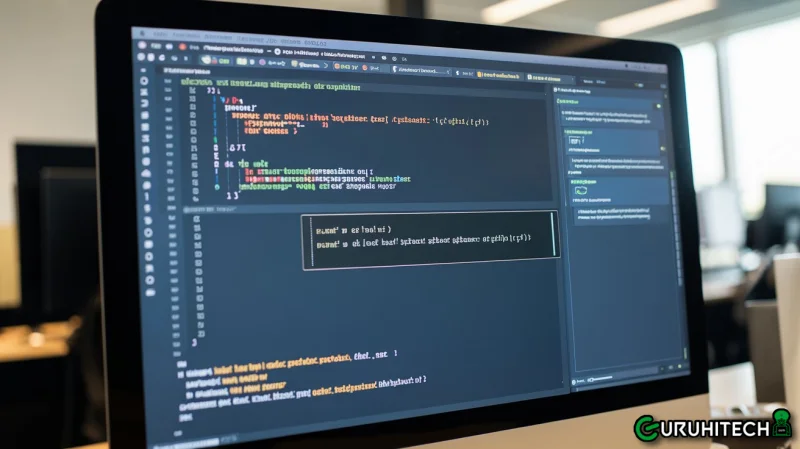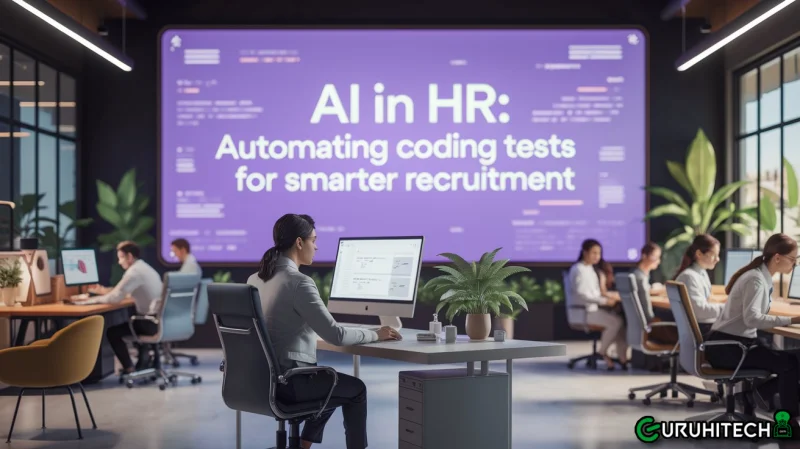AI in HR: Automating Coding Tests for Smarter Recruitment

In today’s competitive job market, finding the right talent is more challenging than ever. Companies are constantly seeking ways to streamline their recruitment processes while ensuring they hire candidates with the right skills.
One of the most time-consuming aspects of hiring for technical roles is assessing a candidate’s coding abilities. Traditional methods often involve manual test grading, scheduling interviews with engineers, and reviewing countless resumes.
With the emergence of AI-driven technologies, the HR landscape has seen a significant transformation, particularly through the automation of coding tests. This shift allows companies to recruit smarter, save time, and enhance the accuracy of their hiring decisions.
How AI Automates Coding Tests
Artificial intelligence (AI) automates coding tests by generating tailored assessments that evaluate a candidate’s coding proficiency. This technology allows human resources (HR) departments to customize tests according to the skill sets required for each position. Here’s a closer look at how it works:
1. Test Generation: AI algorithms can create coding challenges that reflect the skills required for the role, whether it’s a focus on algorithms, data structures, or specific programming languages. These tests can be adjusted in terms of difficulty, ensuring that candidates at various levels are tested appropriately.
2. Real-Time Evaluation: Once candidates complete their coding assessments, AI systems can evaluate their performance in real-time. These systems not only check if the code runs but also analyze its efficiency, complexity, and adherence to best practices. This ensures that candidates who understand the nuances of clean, efficient coding are prioritized.
3. Automated Feedback: AI-driven coding tests also provide immediate feedback to candidates. This feature helps to improve the candidate’s experience, as they can understand where they went wrong and how they can improve. At the same time,recruiters are provided with a detailed analysis of each candidate’s strengths and weaknesses.
4. Bias Reduction: Human bias is a well-documented issue in traditional recruitment methods. Factors such as gender, race, and educational background can influence hiring decisions, consciously or unconsciously. AI-powered coding assessments focus solely on technical abilities, ensuring that candidates are judged based on their skills rather than external factors.
5. Scalability: One of the primary advantages of using AI in recruitment is its scalability. HR teams can assess hundreds or even thousands of candidates without the bottlenecks associated with manual evaluations. Whether a company is hiring for one position or a hundred, AI can manage the influx of candidates efficiently.

Benefits of Automating Coding Tests with AI
The benefits of automating coding tests extend beyond just saving time. Let’s dive into how this technology enhances the overall recruitment process:
1. Faster Time-to-Hire
Time-to-hire is a critical metric for HR departments. Lengthy hiring processes can result in losing top talent to competitors. With an AI interviewer, companies can significantly reduce the time it takes to assess and shortlist candidates. Automated coding tests enable recruiters to move quickly from initial applications to final interviews, cutting down weeks or even months from the hiring cycle.
2. Cost-Efficiency
Traditional coding assessments can require extensive involvement from technical teams, which pulls them away from core tasks like product development. Automating these tests reduces the need for engineers to participate in the early stages of recruitment, saving both time and resources. Even more, AI-powered solutions can process numerous candidates simultaneously, reducing costs related to manual test administration and grading.
3. Objective and Consistent Evaluations
Manual assessments can be inconsistent, as different evaluators may have varying opinions on what constitutes a “good” solution. AI-driven coding tests remove this inconsistency by applying the same evaluation criteria across all candidates. This ensures that every candidate is judged based on their performance alone, leading to more objective hiring decisions.
To further support fair and structured employee evaluation beyond hiring, many businesses are also adopting performance review software to track ongoing employee development and ensure consistent performance standards. Platforms like Zelt combine recruitment tools with performance management, helping companies maintain a unified talent strategy.
4. Enhanced Candidate Experience
In addition to benefiting companies, AI in coding assessments can also improve the candidate experience. Immediate feedback and the ability to take tests remotely allow candidates to engage with the recruitment process more positively. Furthermore, AI can personalize assessments based on a candidate’s experience level, offering a tailored approach that reduces the frustration of facing irrelevant or overly complex tasks.
5. Reducing Bias and Promoting Diversity
Bias in recruitment has long been a concern, particularly in the tech industry. By automating coding tests, companies can focus on a candidate’s actual skills rather than extraneous factors. AI ensures a more inclusive hiring process, giving candidates from diverse backgrounds a fair opportunity to succeed based on their technical abilities alone.
Use Cases of AI-Powered Coding Tests
Several companies have already adopted AI in their recruitment processes, particularly for technical roles. Let’s explore some real-world use cases:
- Startups and SMEs: Smaller companies often don’t have the resources to run extensive recruitment processes. AI-powered coding assessments can level the playing field by enabling these businesses to compete for top talent without needing large HR departments.
- Large Enterprises: For companies hiring at scale, such as tech giants or multinational firms, AI-driven coding assessments allow HR departments toprocess large volumes of applicants without sacrificing quality.
- Remote and Distributed Teams: With the rise of remote work, assessing candidates from different parts of the world has become more prevalent. AI powered tests can be taken anywhere, anytime, ensuring that geographical limitations don’t hinder the recruitment process.

The Future of AI in Recruitment
As AI continues to evolve, its role in HR will expand beyond coding assessments. It’s likely that AI will assist in developing more comprehensive recruitment strategies, from initial sourcing to final onboarding.
Additionally, as AI technologies become more accessible, we will likely see increased adoption across industries that require specialized technical skills. The potential for AI to improve the overall quality of hires while reducing costs makes it a valuable tool for businesses of all sizes.
Final Thoughts
AI in HR is reshaping how companies approach recruitment, particularly in the tech industry. Automating coding tests provides a smarter, more efficient way to assess candidates’ abilities, eliminating biases and improving the overall candidate experience.
As the demand for top talent continues to grow, companies that leverage AI-driven solutions will be better positioned to stay competitive and make data-driven hiring decisions.
In an era where the war for talent is intensifying, automating coding tests with AI isn’t just a trend—it’s a necessity for smarter recruitment.
Ti potrebbe interessare:
Segui guruhitech su:
- Google News: bit.ly/gurugooglenews
- Telegram: t.me/guruhitech
- X (Twitter): x.com/guruhitech1
- Bluesky: bsky.app/profile/guruhitech.bsky.social
- GETTR: gettr.com/user/guruhitech
- Rumble: rumble.com/user/guruhitech
- VKontakte: vk.com/guruhitech
- MeWe: mewe.com/i/guruhitech
- Skype: live:.cid.d4cf3836b772da8a
- WhatsApp: bit.ly/whatsappguruhitech
Esprimi il tuo parere!
Ti è stato utile questo articolo? Lascia un commento nell’apposita sezione che trovi più in basso e se ti va, iscriviti alla newsletter.
Per qualsiasi domanda, informazione o assistenza nel mondo della tecnologia, puoi inviare una email all’indirizzo [email protected].
Scopri di più da GuruHiTech
Abbonati per ricevere gli ultimi articoli inviati alla tua e-mail.
